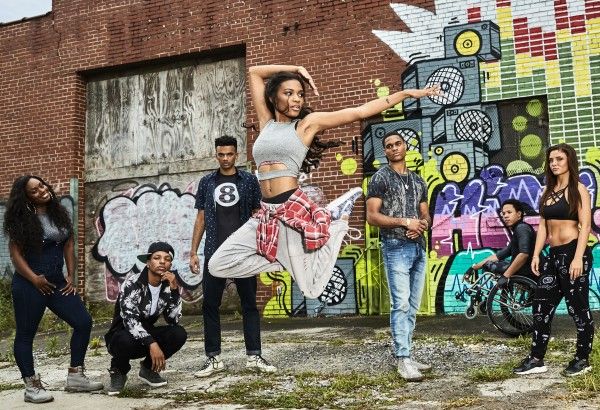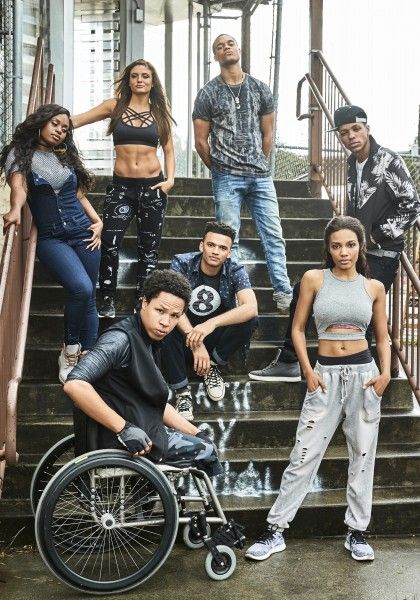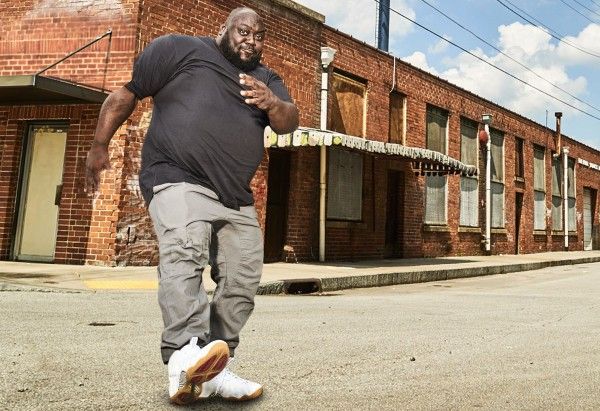If you’re a fan of the Step Up films, you love great dance and performance numbers, or you’re just looking for something inspiring and aspirational to watch, you should check out Step Up: High Water, streaming on YouTube Red. In the 10-episode first season, Sage Odom (Ne-Yo), the legendary founder of Atlanta’s famed High Water Performing Arts School, has returned to find dancers for his upcoming world tour, while the students pay their dues to prove they have what it takes to live out their dream. From creator/showrunner Holly Sorensen, the series also stars Naya Rivera, Faizon Love, Lauryn McClain, Petrice Jones, Jade Chynoweth, Carlito Olivero, Terrence Green, Eric Graise, Kendra Oyesanya and Marcus Mitchell.
During this 1-on-1 phone interview with Collider, Step Up: High Water executive producer/pilot director Adam Shankman, who also produced the films, talked about how a Step Up TV series came about, the desire to take it back to what was so special about the first film, the goal for the dance aspect of the series, how grueling the casting process was, the biggest production challenges, what they’d like to do in future seasons, and what made the first Step Up film, with Channing Tatum and Jenna Dewan, so special. He also talked about how things are coming along with the Enchanted sequel, Disenchanted, why it’s been in development for awhile, and what he’s looking to do with the music, along with two other TV series that he’s currently developing.
Collider: Usually when you have a franchise around as long as Step Up has been around, you have to start talking about taking the franchise into space or something crazy like that, but instead you’re taking it to TV. How did Step Up evolve into a TV series?
ADAM SHANKMAN: This new incarnation has really reinvigorated the entire narrative of the Step Up universe, and that makes me super happy.
Had you ever talked about or thought about making a TV series for Step Up, at any point during the movies?
SHANKMAN: The first movie was meant to be a one-off film that we made, like any other movie, where there was no intention of anything further happening. How the series happened had everything to do with the cost vs. the performance of the movies and how the fan base continued to grow. It really is actually a story about the power of the internet because what couldn’t be ignored was the internet presence of the Step Up world, all the way back to the MySpace family. It was one of the biggest movie MySpace pages in history.
Susanne Daniels, who’s now running YouTube Red, through other incarnations of her career and other places that she ran, had always wanted the title. I had seen her at various places and she had mentioned it to me, and I was like, “Sounds great!,” but it was one of those things where we weren’t actively trying to develop it. And then, she landed at YouTube Red and, from what I’m led to understand and from what I know to be true, one of the top five things, if not top three things, that is clicked upon at YouTube is dance. There was a very quick decision that this was a perfect fit for YouTube Red, as a platform, because it was very on brand.
So, they approached Lionsgate, and then Lionsgate approached me and my company, and my sister Jennifer [Gibgot], who’s one of the other producers who’s been on since the beginning, our big mandate was, “Sounds great, but in order to create a continuing organic narrative for the characters to be able to dance, we want to go back to the first model, which was the Channing [Tatum] and Jenna [Dewan] movie, with an institution at the center of it. One of the things we felt happened with the last three movies was that the context with which the characters were dancing started to get a little outrageous. We wanted it to be more aspirational in an Earthbound way. So, when we were talking to different showrunner/creator types to run it, Holly Sorensen came in with what we found to be the most interesting take on what that world and institution could be. That’s how we ended up with the show.
To be perfectly honest, what happened was that they bought the show, put it forward, and then said, “Now you guys have to figure it out.” They committed to ten episodes of a show that didn’t exist, with no showrunner and no script, which was crazy, but awesome. Then, we had to figure out what the show was gonna be. It wasn’t like they were gonna just say yes to anything. We had to figure it out in a way that made sense, but that is how it all happened.
It’s one thing to put together enough impressive, death-defying choreography for a 90-minute or two-hour movie, but it’s another thing to put together enough exciting choreography for an ongoing TV series. What was your goal for the dance aspect of this?
SHANKMAN: The goal for the dance aspect is to be credible and aspirational, in terms of how you feel, as a dancer, and the work that you put in. As a dancer, you’re an athlete and need to treat it as something you have to practice and perfect and go after, in the exact same way that any athlete would have to go after excellence in their field. That’s the credible part. And then, the aspirational part is with the performance element, and it has a little bit more sparkle on it. That’s how we tackled it. We didn’t even think about it like, “Okay, there needs to be a requisite three numbers per episode.” We said, “What does each episode call for?” We knew there had to be dancing, but the dancing was based on what would naturally be happening and what we thought would be fun.
You have known cast members, like Ne-Yo, Naya Rivera and Faizon Love, but the dancers are fresh faces to most of your audience. How grueling was the casting process for this?
SHANKMAN: It was a very grueling process. I’m very proud of our casting director, Tamara-Lee Notcutt, who really did a deep dive into the world. We went for dancers first, and found dancers who could act, as opposed to actors we could turn into dancers. It’s not just that we think the dance element is more important. What I think is really important is that they have the heart of a dancer and they can communicate what that energy is properly, and that there is a dedication and a fierceness in how they approach the work.
As the director of the pilot and an executive producer on the series, overall, what were the biggest production challenges in pulling this off?
SHANKMAN: We always were aspiring to make sure that the dance elements were the right size. The schedules were grueling. For the actors, what was really, really hard was that when they were not acting, they were either in costume fittings or rehearsing. There was no time off. That was just how it was going to be, period, end of story. The choreographers were incredibly challenged by the amount of work they had to do, every week. What was mind-boggling was how, by Episode 3, suddenly it had just become a muscle that worked very naturally, where the dancers were just picking up the material, really fast, and were able to perform it, pretty brilliantly, that week. It just worked out really well. But like any show that is music-driven and dance-driven, the challenges are always scheduling and making sure people were getting enough rest and avoiding injury. We had to keep on schedule. Shooting a dance number takes a certain amount of hours, and it’s different than shooting a regular action scene, so how to keep up with all of that was a thing, but you get used to it. Other shows do it, all the time. I directed episodes of Glee, and that’s how it was over there, although they had many more days to shoot an episode. We just did the best we could.
Beyond this season, have you thought about where you’d like to and can take the series, in the future? Would you like to bring in some new dancers, each season?
SHANKMAN: Yeah. The whole thing is constructed so that you could graduate people and bring in new people. The school is the hub, but there are a lot of performance elements. There’s the entire world of Atlanta where people can perform. You can tour, following the Sage Odom character. There are other pop star characters. One of the areas that I would be most excited to explore, in the future, is that all of our core cast can sing and they haven’t sung on the show. They’re great singers, so I hope that can expand because High Water is an arts collective and not just for dancing. I hope that we can open up to other areas. That’s my dream.
When you think back to the first Step Up movie, which really launched the careers of Channing Tatum and Jenna Dewan and forever changed their own lives, what was the magic that it captured, both for everyone involved and for everyone who saw it?
SHANKMAN: I think a lot of that is owed to Anne Fletcher, the director, who just understood what she was making a movie about really well. As loud as we were screaming for Channing and Jenna, two completely unknowns, to be cast in the movie, she was the loudest one. She said, “These are our two! It’s them!” And there was resistance. Oddly, there was more resistance to him than to her. And then, while we were making it, it was one of those movies that was just so under the radar, there was no buzz around it. It was just this thing that was happening, in a city away from Los Angeles. We watched those two, whose chemistry was good when we started and went to eleven by week three. We just had to make sure that nothing happened until production was over, so that they didn’t get into a fight and cause a disaster. We saw it happening and we saw that love, and the energy filled the screen. When you’re doing something that’s so under the radar and no one is looking at it, you feel much more free. Plus, it was about young people aspiring and dreaming, and questioning their artistry and where they are in their lives, and everybody was doing that. Everybody involved was right at that place.
How are things coming along with the Enchanted sequel, Disenchanted? Do you have a possible timeframe for when you’d like to get that into production?
SHANKMAN: We’re turning in a script really soon, and everybody feels really good and gung-ho. I’ve been in touch with Amy [Adams] and the cast, and everybody is really into it. We all love the story about everybody wondering what exactly defines happily ever after. It’s just a very exciting project that we all hope happens. Right now, we’re in a good place.
The sequel seems like it would have been a total no-brainer to get into production, but it’s been in development for awhile now.
SHANKMAN: It’s been in development for a long time, but remember, in the midst of it, there was a big regime change, and a lot of stuff around the studio, figuring out what was important to Disney and how many movies they were going to make a year. There were some big movies that they were right to make, right out of the gate. Their track record is impenetrable. Making a movie over there is very exciting because they do not feel the need to put anything into production until they feel like they have it completely right.
What do you hope to do with the music?
SHANKMAN: As planned right now, there’s more singing and dancing than there was in the first one, and it’s all original music, with Alan Menken and Stephen Schwartz coming back to do it.
You’re also developing two more TV series – Wolfgang, about Wolfgang Amadeus Mozart, and a comedy with Carlos and Alexa PenaVega. What made you want to tell those stories?
SHANKMAN: I’m a huge fan of The Crown, I’m a fan of Reign, and I’m a fan of the high stakes period drama spectre of television programming. I’m so startled, at this point in time, that people will spend so much money on a TV show, but it’s because they’re good. So, with Mozart, we’re trying to get this thing made about one of the most important composers in history. It’s not like he was just really good. He was one of the most important creators, in the midst of one of the most controversial dynasties in European history. It was world-shaping. He was where time bent, in a certain way, and pushed us in a certain direction. Being able to tell a story about that sounds super exciting. David Israel, the writer/creator of it, pitched it to us and we just jumped on it. And the PenaVegas are just who we should all aspire to be, as people. They’re very self-effacing. They’re a modern-day Ricky and Lucy. To see a young couple, who are this committed to each other, have this much a sense of humor about each other’s foibles, and have a warts and all feeling about each other, just feels like a great opportunity in a very cynical world.
Step Up: High Water is available to stream on YouTube Red.




